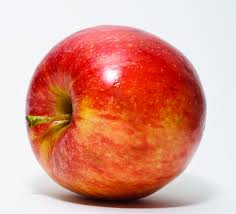
If approved Arctic Granny Smith and Arctic Golden Delicious - two
varieties of genetically modified apples will be available to consumers
by the end of 2013. They will be the second GM fruits allowed into the U.S. food supply after the Hawaiian papaya (Rainbow and SunUp). Created by Okanagan Specialty Fruits in British Columbia, Canada, Arctic
apples do not bruise or brown when sliced, the Washington Times
reported. Browning in apples and potatoes results from polyphenol oxidase (PPO),
an enzyme that produces melanin, a compound that contains iron and gives
cells a brown tint. To create Arctic apples, Okanagan scientists
silenced the apples' PPO genes by inserting a man-made gene that
contains portions of four natural PPO genes. As a consequence, Arctic apples produce less than ten percent of the PPO
produced by conventional apples and therefore do not brown when sliced.
Unlike most genetically modified crops in the U.S., genetically
engineered to resist pests, droughts or chemicals, Arctic apples are
modified purely for cosmetic reasons, nicknamed "Botox apples" by Andrew
Kimbrell, executive director of the Center for Food Safety. But Joel Brooks, Marketing Specialist at Okanagan, disagrees that Arctic
apples' benefits are purely cosmetic, noting that not only do they have
significant potential to reduce food waste, the resistance to browning
results in better taste, texture and likely a retention of healthful
components like vitamin C and antioxidants, which are typically burned
up in the browning reaction. Supporters argue that Arctic apples can potentially increase apple sales
and consumption in the U.S. Arctic apples would be especially lucrative
for sliced packaged apple producers, which lose a large percentage of
their apples to browning and are forced to spray them with an
anti-oxidant that can alter flavor and raise production costs. Arctic apples will also be a beneficial to the foodservice industry,
which does not use a large volume of apples at present, precisely due to
browning. Supermarkets will also benefit as Arctics can potentially cut
down on losses due to bruising and apples that are no longer attractive
for sale. The non-browning apples would even benefit consumers, who would end up
throwing less fruit away and therefore spending less money. Two US agencies currently stand in the way of Arctic apples' journey to
your grocery store produce section: the U.S. Department of Agriculture's
(USDA) Animal and Plant Health Inspection Service (APHIS) and the Food
and Drug Administration (FDA). Okanagan is currently seeking "deregulated status" from USDA and APHIS
for both varieties of Arctic apples, submitting a petition in May 2010.
Specifically, Okanagan will have to prove that Arctic apple crops are
not significantly weaker against plant pests and therefore would not
endanger other crops that are nearby. So far, the Arctic Granny Smith has shown increased incidence of a
leaf-eating bug known as tentiform leafminer, but for the 13 other pests
and diseases tested for by Okanagan, both varieties of Arctic apples
have performed better or the same as conventional apples. The first of two public comment sessions closed in September 2012 and received nearly 2,000 comments. "We expect a second U.S. public comment period, which will be 30 days
long, to open within the next few months and anticipate full U.S.
deregulation later in 2013," Neal Carter, president of Okanagan said in
an interview last month. Okanagan is also voluntarily consulting with FDA to provide proof that
Arctic apples are allergen and toxin free, and safe for human
consumption.Source-ANI
No comments:
Post a Comment